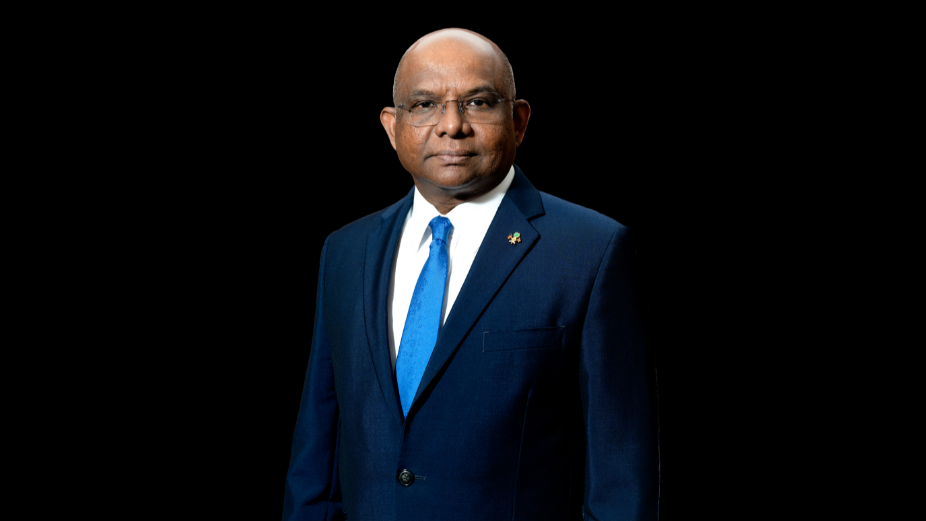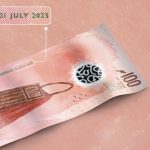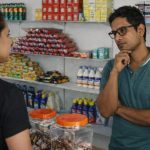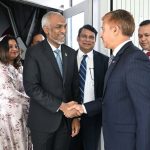
Our team had the privilege of speaking with the Minister of Foreign Affairs, Hon. Abdulla Shahid, whose remarkable career spans the Executive and Legislative branches of the Maldives. From his humble beginnings as a Foreign Service Officer in 1983, Shahid’s dedication and hard work eventually propelled him to the role of the Minister of Foreign Affairs.
As Foreign Minister, Shahid revolutionized the operations of the Ministry, streamlining its functions and expanding its global presence. Despite the initial challenges of a democratic transition, he successfully opened new diplomatic missions, bolstering the international standing and perception of the Maldives.
Can you share details about the beginnings of your career and the experiences that helped shape your professional trajectory?
I joined the Ministry of Foreign Affairs straight after my A-Level examination. It was not as straightforward. I had wanted to join the Ministry right after I finished O’Levels. But when I went to see the then Minister of Foreign Affairs Fathulla Jameel – also one of my mentors – he told me to come and join after my A’Levels. He didn’t want to hire me for three months only. He asked me to come back then.
Eventually, I joined the Ministry in 1983. At the time, there was no orientation for new recruits. We were told that to become a well-rounded diplomat, “we should know how to do everything” – this is something I took to heart. I worked at every level in the Ministry – in those days we had to hand-deliver letters to other Ministries, and I used to do that. During official trips, I started as a junior protocol officer, carrying luggage. The result was that, when I became Minister, I knew what every single staff in the Ministry was doing, because I had done it myself. This helps me run the Ministry efficiently and effectively.
From the beginning, I was blessed with extremely good mentorship. Minister Fathulla Jameel and Deputy Minister Ibrahim Hussain Zaki and several others, were excellent mentors.
After my time at the Ministry, I worked as Executive Secretary at the President’s Office. I joined a well-oiled machinery, where there were standard operating procedures and set ways of doing things. I was privileged to work with many colleagues who had been working in the Presidential Secretariat for more years than I had been alive. I learnt a lot from my colleagues. President Maumoon was a perfectionist – and demanded nothing less than perfection from his staff. This post gave me a birds-eye view of the entire Government machinery, and how the administrative arm of the State worked. I was responsible for ensuring that the President’s policies were being implemented and that the Government was functioning well. This gave me a lot of exposure and experience.
Following the Executive, I moved on to the Parliament. I became the first democratically elected Speaker of Parliament in 2009, under the new Constitution. With the 2008 Constitution, the legislature was separated from the executive. Up until that point, the parliament’s role was largely ceremonial. So, there weren’t enough professionals to work in such a setting, there was no physical space for Members of Parliament to work and limited experience of how a multi-party parliament worked. I had the opportunity to shape the institution and build capacity there as well.
My experiences in various roles and at various institutions in the Government, and in Parliament, shaped my professional career, but also helped me to shape the institutions that I had the opportunity to lead.
How do you plan to promote Maldives’ interests globally through your foreign policy vision? Can you highlight some successful diplomatic initiatives you’ve led as Minister of Foreign Affairs?
The foreign policy of President Solih was set out in his inaugural address. Our foreign policy is geared towards advancing policies that have a stake in the progress and welfare of the country. It is formulated on the basis of climate diplomacy, human rights, and democracy promotion. The President further noted that we will fortify existing relationships with India and other regional countries, as well as bolster our shared role to retain enduring peace and harmony in the Indian Ocean. The President declared that the Maldives will be willing and open to establishing diplomatic relations and strengthening existing ties with all countries that wish to form mutually beneficial development partnerships. Our diplomacy is utilized to promote and further these goals.
First, we seek to strengthen our relationship with countries. Over the last 4 years, the number of countries with which we have diplomatic relations has increased to 185 countries. We resumed diplomatic relations with Qatar and Iran. At no point in our long history has our diplomatic reach been as extensive and solidified as we witness today. We have resident Ambassadors accredited to 17 countries, and 2 Consul Generals. We have accredited non-resident Ambassadors to 26 countries with 12 more pending appointments. This includes many firsts including in Africa. We have re-opened our Mission in Washington after closing the Embassy in 2008. We have welcomed the establishment of Missions in the UK, the USA and also Australia in the Maldives.
Stronger relationships with countries mean better chances to seek outcomes that are beneficial to the Maldives. This means easing travel, better connectivity, easier means to attract investment, attracting more tourists, and facilitating more trade and aid. Maldivians can now travel to over 90 countries without obtaining a prior visa. This makes our passport stronger. We have mobilized up to $3.4 billion in grants, concessional loans, lines of credit and in-kind assistance since November 2018. These are milestone achievements, that will increase both people-to-people contacts between the Maldives and the countries of the world but will also increase investment in the Maldives and broaden the markets for Maldives tourism. These are indications of the growing strength of our relationship with countries around the world.
Second, we aim to utilize multilateral forums to pursue our foreign policy goals. The Maldives joined the Indian Ocean Rim Association (IORA) in 2019, fortifying our relationship with the Indian Ocean countries.
In 2020, we rejoined the Commonwealth as its 54th member state, after an almost 3-year absence from the organization. This has opened the doors for Maldivian students to receive Commonwealth scholarships and for Maldivian athletes to participate once again in the Commonwealth Games and gain valuable experience and knowledge. It has also opened the door for technical cooperation and subsequently, capacity building and institutional building opportunities between various Commonwealth organisations and local agencies.
In 2021, the Maldives was elected as the President of the 76th Session of the United Nations General Assembly. The Maldives won the candidature with 143 votes out of 191 total votes cast. The Presidency of Hope focused on responding and recovering from the COVID-19 pandemic, sustainable development and climate action, human rights and revitalizing the United Nations.
Just a year later, in 2022, the Maldives was elected as a member of the United Nations Human Rights Council for the term 2023-2025, with 154 votes out of a total of 189 votes cast. This was an overwhelming show of confidence and support for the Maldives’ foreign policy and a testament to the trust and standing accorded to the Maldives by the international community.
In 2021, the Maldives also became a member of the Organisation of African, Caribbean and Pacific States (OACPS). This is a first step in enhancing the Maldives’ relations with fellow developing countries, especially small island developing countries and the African continent, and to leverage the combined strength of our countries to protect and promote the interests of the Maldives in the international arena.
Maldives has continued to lead on issues pertaining to small states, environmental issues and human rights. In 2022, under Maldives’ leadership, the UN declared the 24th of June as the ‘International Day for Women in Diplomacy’. This resolution garnered 191 co-sponsors – the most any resolution has been co-sponsored in the General Assembly. The Maldives with other states, also led efforts to recognise the right to a clean, healthy and sustainable environment at the Human Rights Council as well as the General Assembly, in 2022. The Maldives has continued to play a bridging role in the climate negotiations.
Through this leadership and engagement, we are seeking to gain the trust and confidence of the international community towards the Maldives. By being on these platforms, we will be able to elevate the concerns of the Maldives, such as climate change, and sustainable development, and protect the interests of the Maldives at the highest echelons of international relations. Through the trust of the international community, we will be able to further serve our national interests.
How did the Ministry mobilise assistance for the Maldives during the COVID-19 pandemic?
At the height of the COVID-19 pandemic, the Ministry of Foreign Affairs and our diplomatic missions abroad, worked tirelessly to ensure the realisation of the needs of the Maldivian people.
As the pandemic took hold, the whole world went into lockdown and to an abrupt halt. The Maldives is a heavily import-dependent country. We bring everything from outside. So, we had to negotiate and find ways to mobilise what we needed.
From the beginning of the pandemic, our diplomats in Headquarters and in Missions, in coordination with local authorities, worked on securing the health equipment, and medicines necessary. In one operation, we coordinated in airlifting essential medicines that had been purchased by private parties and were held up in multiple cities of India, due to lack of connections, and brought them to the Maldives, in coordination with the Indian Government. We repatriated students and Maldivians from several countries, including from Wuhan, China. Where we could not repatriate, we kept regular contact. We also facilitated the sending of care packages and the provision of essential medicines that were not available in the Maldives.
We sourced essential food items and commodities, as well as negotiated for financial support. The Maldives was one of the first countries in the region to start vaccination. This was because we had started the negotiations quite early on when the vaccines were still in development.
When the borders opened, we worked with Maldives Marketing and Public Relations Company, the Ministry of Tourism and the Ministry of Health, to promote the Maldives and inform the world of the COVID-safety measures taken in the country.
I am immensely proud of the work we did during the pandemic, proud of our response efforts, and what we accomplished under very difficult circumstances.
What’s your strategy for building and maintaining strong relationships with other countries and international organizations?
Trust is an important factor in maintaining strong relationships with other countries and international organisations. We believe in building relationships on the virtue of trust with other countries; by engaging consistently and constructively with them. It cannot be done overnight, it is fostered through the accumulation of perseverance and dedication. Sometimes, we face a lot of criticism regarding travel or attending international conferences. Diplomacy is an instrument of good governance based on interactions – especially face-to-face interactions. These interactions support the building of relationships and ultimately strengthen trust between nations. This is the key to achieving Maldives’s foreign policy objectives internationally.
You would see that we have increased the number of policy dialogues between us and partner countries. We are confident that this will increase coordination between our countries and strengthen existing relationships between the Maldives and our partners. We are working to expand our relationships with Africa, ASEAN and Central Asian countries; bilaterally and through multilateral organisations. We believe that this will enhance our outreach, and ultimately work to serve our interests.
You have to build credibility for other countries and organisations to respect you. This means you follow what you advocate for. This is why in order to become a respected member of the international community, we need to respect international norms and principles and international law. International law is what determines equality among states – regardless of size or might. We need strong domestic institutions, the promotion of good governance and human rights.
How are you promoting trade and investment opportunities for Maldives on the global stage and which industries do you see as having the most growth potential?
The Economic Cooperation Department of the Ministry of Foreign Affairs is mandated to work with national stakeholders and international organisations and partners to facilitate trade and investment opportunities for the Maldives in the global arena. Over the last 4 years, we have held a number of investment forums, both virtually and in a hybrid format aimed at a wide range of markets and countries. These forums have also been aimed at diversifying investment in the Maldives and minimizing the reliance of our economy on a single sector.
Our missions abroad are continuously working to identify new opportunities for trade and investment in the Maldives and also to promote Maldivian trade and products in international markets. I am happy to note that Authentic Maldives products are now available for purchase at the Narita International Airport in Japan.
Our tourism sector is still one of the most successful tourism sectors in the world – especially in the post-COVID-19 recovery. It is a good example of all stakeholders – public and private – working together. Also, in terms of sustainability and environmentally-conscious efforts. I believe there is potential for further increase in tourism numbers, as well as to attract investments. This is why we are working on establishing more air connectivity, as well as promoting investment in the lucrative tourism sector of the Maldives.
What advice would you give to young people aspiring to pursue a career in diplomacy or international affairs, and what skills do they need to succeed?
In 2022, President Ibrahim Mohamed Solih ratified the Foreign Service Act, kickstarting the process of establishing a professional foreign service cadre. This has been a long-held dream of the Foreign Service, including myself.
We are keen to welcome more young people into the Ministry as the Maldivian Foreign Service matures into a more professional and more capable service. The Ministry already employs a lot of young people, which enhances its dynamism.
For all young people aspiring to pursue a career as a foreign service officer, my advice is to have a keen, committed work ethic. A diplomat is not built overnight. It is a gradual process, where layer after layer is added. Those layers are education, knowledge, and experience.
A good foreign service officer must be inquisitive, curious, and ready to learn new information and new skills, as they must undertake a wide variety of tasks throughout their career. I can tell you from my personal experience, being flexible and always ready for a challenge is key to becoming a successful foreign service officer.
I would encourage them to read as voraciously and as broadly as possible, as a keen understanding of current affairs is an important asset for any foreign service officer. It is especially important to critically analyse the available material, apply it to national contexts, understand the nuances of foreign policy, and enhance your general knowledge on an array of topics. The right education is important. When I entered the Ministry, there were only 2 graduates in the Ministry. When I returned this time as a Minister, over 60% of the Ministry has at least a first degree. I have prioritized training foreign service officers, including strengthening our Foreign Service Institute.
Learning a foreign language, especially widely spoken languages such as French, Chinese, Arabic and Spanish will be an added bonus for any young people interested in pursuing a career at the Ministry of Foreign Affairs. I remember a dinner I went to in Geneva. The Ambassador that was hosting the dinner, spoke to every single person at that table in their own language. I came away very impressed. This is the vision I see for the Maldivian Foreign Service Officers of tomorrow.








